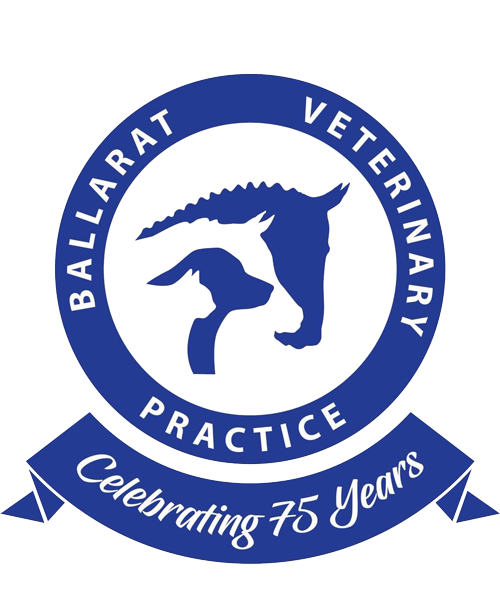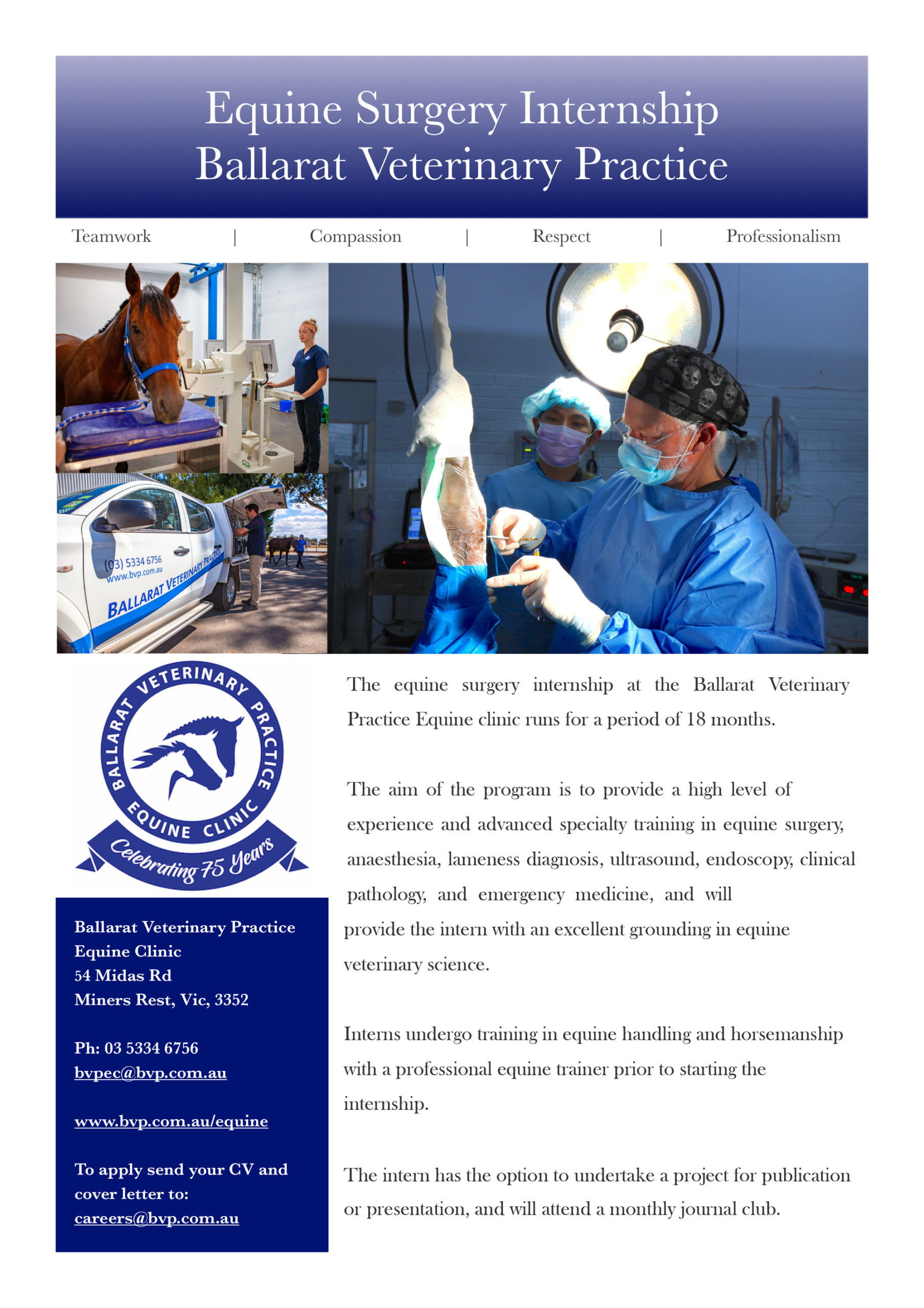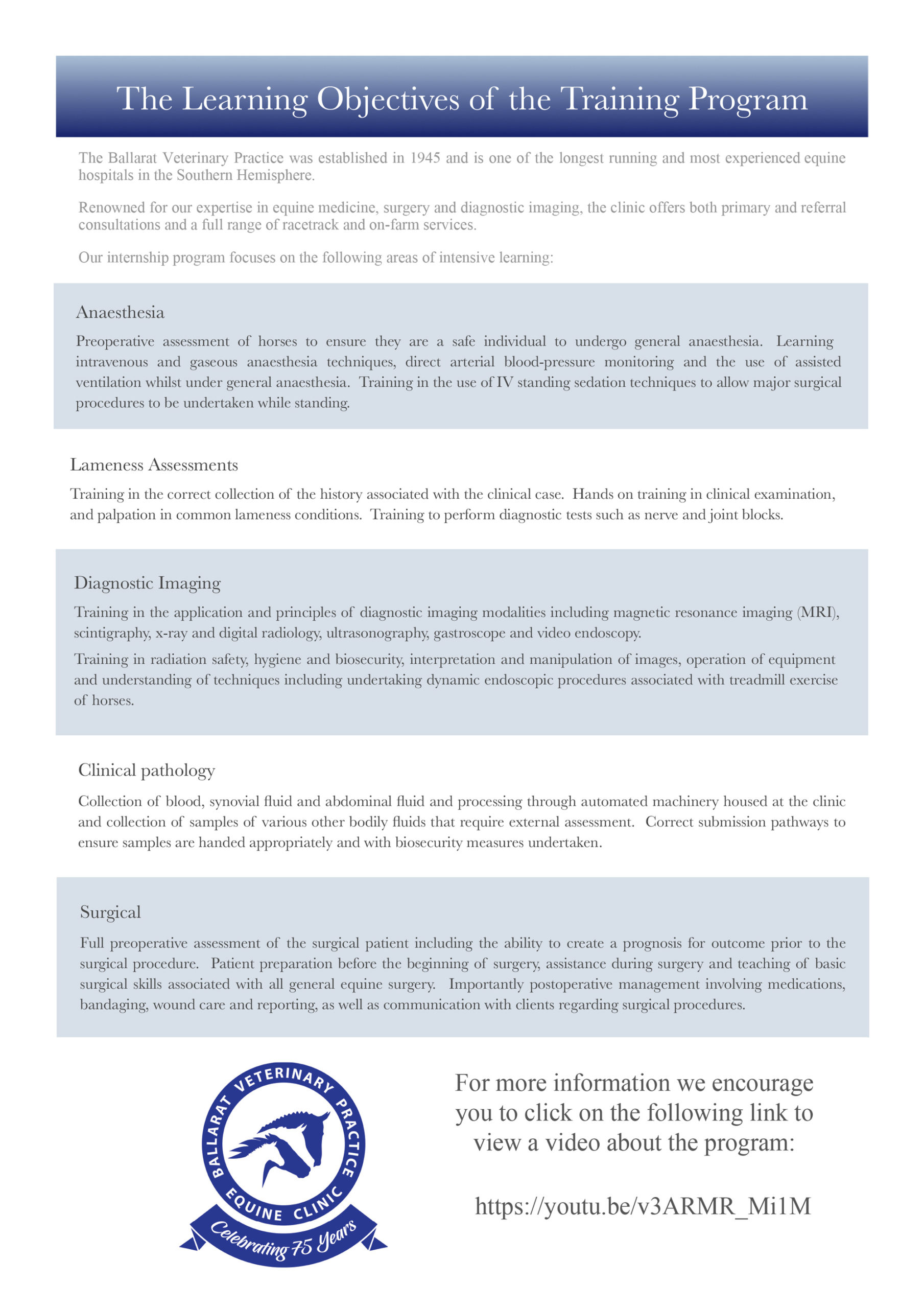Equine Surgery Internship Outline – 2022 Position Available
Ballarat Veterinary Practice 2022-2023
The equine surgery internship at Ballarat Veterinary Practice runs for a period of 18 months. During this time the intern will undertake rotations through the surgery, anaesthesia, medicine, diagnostic imaging and clinical pathology aspects of the practice.
Interns begin with four to eight weeks of intensive training in equine anaesthesia. During this time, skills associated with all aspects of general anaesthesia and advanced standing sedation for surgical procedures will be taught. Over the period of the rotation, the intern will perform pre-anaesthesia assessments and anaesthetic planning, catheter placement, induction and maintenance of anaesthesia or sedation as required. Monitoring during general anaesthesia will also be taught to allow safe maintenance of general anaesthesia.
On successful completion of the anaesthesia rotation, the intern will be allocated on a rotating basis to the three surgeons within the practice. During their time with each surgeon, the intern will be responsible for pre-operative assessment, drug administration, maintenance of patient records, and managing discharge instructions for the surgeon. The intern will be trained in the taking of radiographs, performing ultrasound, carrying out upper airway endoscopy, and will spend time learning to undertake bone-scans and in some instances MRI examinations.
Attention to the written record is essential to each surgeon, ensuring that all medical records are accurate and that billing is thoroughly recorded electronically via the SmartFlow App using clinic iPads.
The intern will receive training in the correct collection of the history associated with the clinical case. Hands on training in clinical examination, and palpation in common lameness conditions will occur as part of the lameness assessments rotation. Training to perform diagnostic tests such as nerve and joint blocks will also be provided.
A rotation through the diagnostic imaging modalities available within the clinic will occur as part of the internship where the following diagnostic imaging modalities will be taught:
MRI
The principles of MRI and image interpretation will be trained. Interns will assist with the acquisition of images.
Scintigraphy
Principles of how to perform a scintigraphic examination in the horse, radiation safety information when working with horses undergoing bone scan scintigraphic procedures, pre and post scintigraphy works-ups with the specialists, interpretation of images and operation of the scintigraphy unit to collect images.
X-ray and Digital Radiography
Training in anatomy of all areas where radiographs are used. Understanding occupational health and safety concerns with radiation. Training in collecting and interpreting radiographic images and in manipulation of the images to allow better diagnostic outcomes.
Ultrasonography
Training in the use of advanced ultrasonographic equipment especially associated with lower limb injuries in horses and abdominal ultrasound for assessment of colic cases. Training in image collection, interpretation, storage and anatomy of the various regions would be expected.
Gastroscope and Video Endoscopy
Training in the operation of video endoscopic equipment, understanding the techniques used for both upper airway endoscopy and examination of the stomach. Also, training in undertaking dynamic endoscopic procedures associated with treadmill exercise of horses. Training in care and hygiene and biosecurity associated with respiratory tract procedures involving endoscopy.
During the clinical pathology rotation, collection of blood, synovial fluid and abdominal fluid and processing through automated machinery housed at the clinic and collection of samples of various other bodily fluids that require external assessment will be taught. Correct submission pathways to ensure samples are handed appropriately and with biosecurity measures undertaken will also form part of this rotation.
Location
Ballarat is Victoria’s third largest city, with a population of over 100,000 and is located just over an hour by road or rail west of Melbourne. Take a look at what Ballarat has to offer!
The Ballarat Veterinary Practice Equine Clinic was established in 1945 and is one of the largest and most experienced equine hospitals in the Southern Hemisphere.
The clinic is located adjacent to Dowling Forest Racecourse, and in close proximity to numerous high profile thoroughbred racing stables. Approximately 500 horses are trained on-course.
The clinic has one registered specialists in Equine Surgery: Dr Brian Anderson who is supported by ACVS trained Dr Travis Smyth, and Dr Massimo Delli-Rocili. There are also six associate veterinarians based at the site, along with the team of four interns who support the surgery and lameness clinicians.
BVP Equine Clinic is especially renowned for respiratory surgery and advanced diagnostic imaging including scintigraphy, magnetic resonance imaging, digital radiography and exercise respiratory endoscopy. It is also home to Victoria’s only standing MRI machine. The hospital accepts referrals form veterinarians from across Victoria and interstate, as well as providing service to local race horses, as well as sport and pleasure horses.
The clinic is complemented by five companion animal practices and a further regional equine ambulatory practice.
Salary Package
The salary is $56,000 per annum, plus superannuation and additional benefits which include access to continuing education and AVA membership.
A car and a mobile phone are also provided.
Veterinary Registration Requirements for Australia
It is necessary for the applicant to be able to be registered in Victoria, Australia. Applicants will only be considered for the position if they meet the full registration requirements of the Veterinary Practitioners Registration Board of Victoria.
Unfortunately, the qualifications obtained from many veterinary schools in Europe, South America, Asia are not recognised by the Veterinary Practitioners Registration Board of Victoria and we will not consider applicants who cannot be fully registered.
Working Visa requirements for Australia
Ballarat Veterinary Practice has accredited sponsorship status with the Department of Home Affairs, and will assist the successful applicant with the visa requirements for working in Australia.
Emergency?
If you have an AFTER HOURS EMERGENCY please call us at these numbers.
0428 346 756
5pm - 8am


